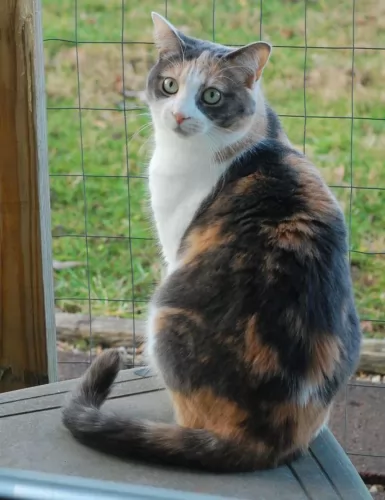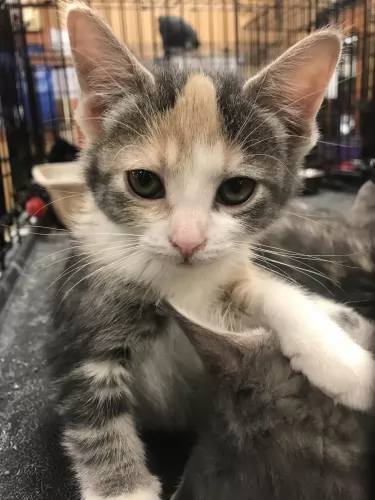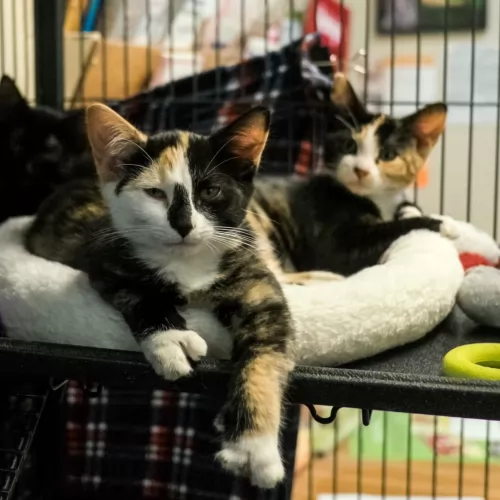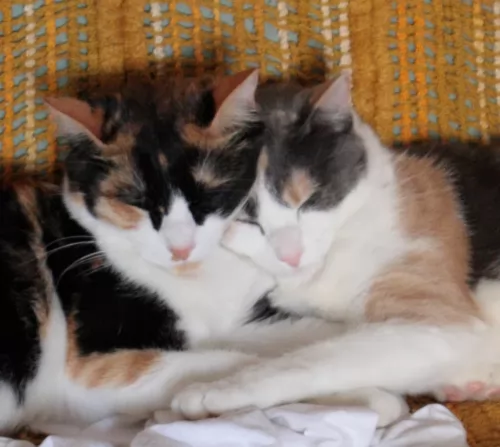 Petzlover
PetzloverDilute Calico is originated from Egypt but Viverral is originated from United States. Both Dilute Calico and Viverral are having almost same weight. Dilute Calico may live 5 years more than Viverral. Both Dilute Calico and Viverral has same litter size. Dilute Calico requires Moderate Maintenance. But Viverral requires Low Maintenance
 The Calico isn’t a breed of cat but is describing a color and pattern of the cat. Many breeds of cats can be calico, and ‘Dilute Calico’ simply means that the color of the cat is less intense.
The Calico isn’t a breed of cat but is describing a color and pattern of the cat. Many breeds of cats can be calico, and ‘Dilute Calico’ simply means that the color of the cat is less intense.
An example of this would be cream being the dilute shade of red, almost like strawberry blonde. People interested in the origins of the cat trace its history back to the trade routes in Northern Africa and Europe, and more specifically to the port cities along the Mediterranean Sea.
A Calico cat is described as having 3 colors - white, black, and red and Dilute Calico cats have ‘toned down’ shades of these 3 colors.
 These are beautiful cats that can essentially have any size and shape and can weigh between 3 and 6kg. Their coat too can be in different colors and patterns and these don’t have any effect on the cat’s persoality.
These are beautiful cats that can essentially have any size and shape and can weigh between 3 and 6kg. Their coat too can be in different colors and patterns and these don’t have any effect on the cat’s persoality.
Your Dilute Calico can have a short- or long-haired coat. Also, because the dilute calico coloring isn’t linked to any particular cat breed, these cats can be any size or shape really.
They are also nearly always female. Remember that while genes do have an effect on how your Dilute Calico looks and behaves, socialization plays a big part, and where possible, to get your cat from a reputable breeder.
Because calico cats are a coat-color and not a breed, you can find long hair dilute calico cats. The personality of the Dilute Calico is described as colorful as well as they’re fun-loving, independent, spunky cats that are sweet and loving too.
 As already mentioned, the Dilute Calico isn't a specific breed but rather a color. The calico can be any breed. The average lifespan of any cat is 12-16 years. The males are far rarer than the females and they live shorter lives.
As already mentioned, the Dilute Calico isn't a specific breed but rather a color. The calico can be any breed. The average lifespan of any cat is 12-16 years. The males are far rarer than the females and they live shorter lives.
Cancer is a terrible disease in cats and dogs and it is where cells grow uncontrollably, spreading to all areas of the body. For any sign of illness in your Dilute Calico, get him to the vet.
Make sure your cat is vaccinated against the deadly cat diseases there are such as Feline Immunodeficiency Virus (FIV).
Both males and females can develop lower urinary inflammation, which is also called Feline Lower Urinary Tract Disease (FLUTD). You’ll notice your pet straining to urinate. It’s time to get your pets to the vet with this terrible illness.
 Prepare for your cat – have food dish, water bowl, litter box, cat food, brush, climbing tree, scratching post, cat toys, and cat bed to welcome your pet.
Prepare for your cat – have food dish, water bowl, litter box, cat food, brush, climbing tree, scratching post, cat toys, and cat bed to welcome your pet.
When it comes to commercially manufactured cat food, there are many excellent ones on the market and you can choose from dry and wet cat food. If in any doubt about what is best for your cat, speak to your vet. Your cat is a carnivore and will need food that pays special attention to meat. A kitten will require 4 small bowls of food a day and by one year of age your cat can be receiving 2 smaller meals a day. Provide cool, fresh water around the clock..
Brush your Dilute Calico gently once a week. Some of the longer-haired Dilute Calicos will require brushing twice a week. At this grooming time, check that the eyes are nice and clear, free of discharge, check that the inside of the ears are free of wax and dirt build-up and check inside the mouth that there aren’t any troublesome teeth.
Whether your cat is an indoor cat or he goes outside occasionally, check for ticks and fleas and get him to the vet to check for internal parasites. Your cat will need to be dewormed and to receive all his cat vaccines to avoid some of the deadly cat diseases there are.
If your cat does go outside, make sure he has a cat collar and an ID tag.
Keep the litter box hygienically clean as cats won’t use a messy litter box. You can buy small scoops and rakes from the pet shop and rake up his droppings throughout the day.
Always have your cat neutered or spayed as there are way too many unwanted kittens in the world. Having them ‘fixed’ reduces lots of illnesses such as urinary inflammation.